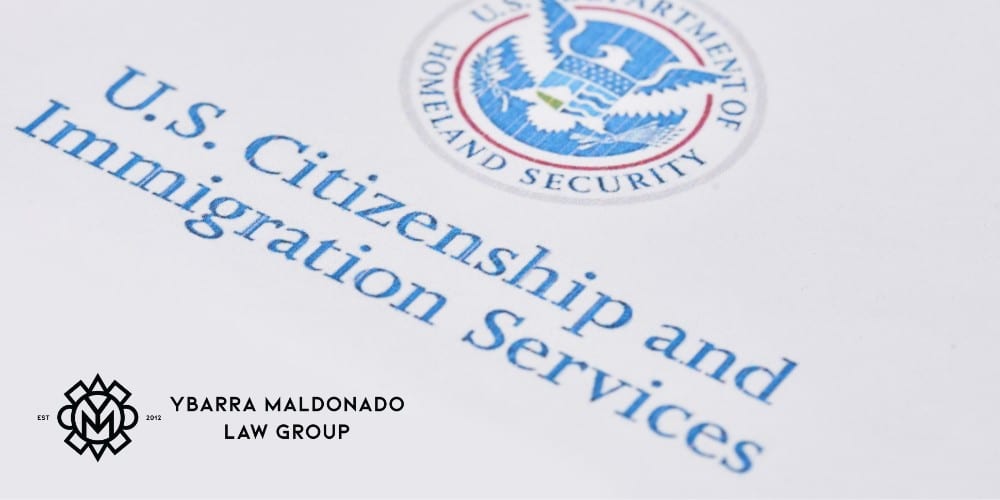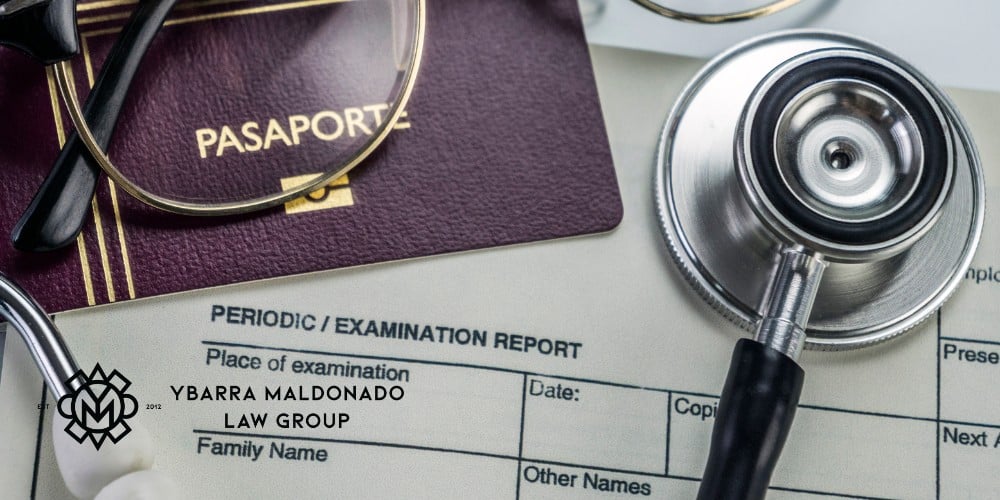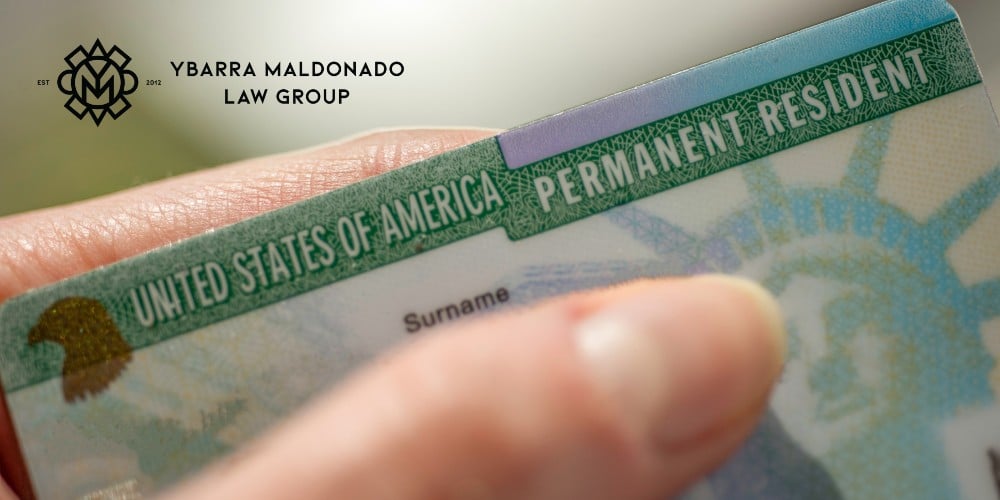Immigration Form I-693: Report of Medical Examination and Vaccination Record
DON’T HESITATE TO REACH OUT TO US!
Our Law Firm is committed to becoming the best Law Firm for Latino, migrant, and Spanish speaking communities in Arizona.

To become a permanent resident of the United States, you must submit what’s called Form I-693. This form establishes your eligibility to enter the United States based on a medical examination. The U.S. Citizenship and Immigration Services (USCIS) requires this evaluation to ensure people immigrating to the country don’t have a health condition that might make them “inadmissible.” Ybarra Maldonado Law Group offers a complete guide to the Form I-693 medical exam for immigration.
To schedule a case evaluation with our qualified Phoenix immigration lawyers, please call our office at 602-910-4040 today.
What Is a United States Citizenship and Immigration Services I-693 Form?
Form I-693 is a Report of Medical Examination and Vaccination Record required by the U.S. government for people immigrating to the country or attempting to register permanent residence. Anyone seeking to get their Green Card must submit one of these forms. It’s used to ensure that they’re in good health and don’t have any illnesses that could spread to others.
To complete the form, you must visit the U.S. Department of Health or a doctor who’s certified by the USCIS. They will complete the medical examination and list any health concerns on Form I-693.
When Should I File I-693?
Form I693, Medical Examination and Vaccination Record (“Medical Report”), must be completed by a USCIS-designated civil surgeon for any green card persons pursuing adjustment of status in the United States with the submission of Form I-485.
The Form I-693 medical report, on the other hand, is not required to be filed simultaneously with the I-485 application by the United States Citizenship and Immigration Service (USCIS). I-485 applicants can either present the medical examination report to an interview (if one is scheduled) or wait until the USCIS sends a Request for Evidence (RFE) demanding the report.
To save time and prevent adjudication delays, complete the Form I-693 medical examination to USCIS promptly. Bear in mind that since the filing of the solo Form I-693 is not regarded as a distinct application for an immigration benefit, USCIS might not always associate the medical exam with the correct I-485 application or might inadvertently lose the medical report.
As a result, the timeliness of the Form I-693 submission is critical, and there could be additional case-specific factors to consider when selecting an alternative. Anyone who has an outstanding I-485 adjustment of status petition or who is about to file an I-485 application should consult with their immigration attorney to determine the best course of action. Our trusted Phoenix immigration attorneys may be contacted at 602-910-4040 and would be pleased to help you and answer any inquiries.
How Do I Submit an I-693 Form?
You must receive the finalized Form I-693 in a sealed envelope from the civil surgeon, signed, to submit it to USCIS. If the civil surgeon’s paperwork isn’t in a sealed envelope, don’t accept it. Should your Form I-693 not be in a sealed envelope or if it has been opened or changed in any way, USCIS will reject it and send it back to you. For your records, the civil surgeon will also provide you with a copy of the completed Form I-693.
Send your finished Form I-693 to USCIS in a sealed envelope. Per the technical instructions, Form I-693 should be dated no more than 60 days before the underlying application is submitted. From the date of the civil surgeon’s signature, a correctly and timely completed Form I-693 is legitimate for two years.
What Is the Purpose of an Immigration Medical Examination?

The medical reasons for inadmissibility, medical examinations of foreign nationals, and immunizations given to foreign nationals are all aimed at safeguarding the health of the American people. Inadmissibility based on public health grounds intends to protect U.S. citizens from harmful physical or mental disorders.
The information used by US Citizenship and Immigration Services (USCIS) to assess if a foreigner passes the health-related conditions for admission comes from the immigration medical examination, the subsequent medical examination report, and the vaccination record.
What Is an Immigration Medical Exam?
The immigration medical exam appointment isn’t a comprehensive examination for all health-related reasons. The goal is to check for particular medical issues that are important to immigration legislation and government agencies in the United States. The US government does not require the doctor to examine you for problems other than those the US Public Health Service designates for immigration purposes.
Similarly, regardless of whether the doctor detects other health conditions, the government does not force the doctor to present you with a diagnosis or treatment for other medical exam results. This exam is not intended to replace a comprehensive physical exam, assessment, diagnostic, or care by your PCP.
What Is a Civil Surgeon?
Civil surgeons are doctors who conduct medical examinations on newcomers to the United States, especially immigrants pursuing permanent resident status or specific visas. They are doctors who have worked in their chosen specialization for at least four years and are licensed. They need to be accredited by the United States Citizens and Immigration Services to work as civil surgeons (USCIS).
Aside from immigration examinations, a civil surgeon might or might not specialize in surgery. These examinations do not include surgery. Infectious illness tests, vaccines, and a mental and physical assessment are all included. The doctor providing the exam is accountable for maintaining that it meets all of the rules set out by the Centers for Disease Control and Prevention in the United States (CDC).
If an immigration medical exam is given by anyone who is not a civil surgeon, the evaluation will not be accepted, and the candidate will need to obtain another exam from a licensed civil surgeon.
What Should I Expect During My Immigration Medical Examination?
The medical exam for a green card differs from a standard physical from your primary care doctor. The physician will not provide a “pass” or “fail” mark to you, depending on your general health.
The doctor will review your vaccination records and medical history with you throughout the medical checkup. They shall inquire over your overall health and in specifics. You’ll also undergo a basic physical examination.
Furthermore, the doctor will search for particular ailments that belong within the below groups:
- Diseases that are spread from person to person (including tuberculosis, syphilis, and gonorrhea)
- Addiction to drugs or drug abuse
- Physical or mental illnesses linked to dangerous conduct
- Conditions that prevent you from being able to sustain yourself
They do this by conducting a tuberculosis test, a blood test for syphilis, and a urine test for gonorrhea, vaccination screenings, and drug and alcohol screenings (including past and present drug/alcohol use and prescriptions).
Also, even if they are on their period, female applicants must undergo the medical exam to another extent.
Pregnant ladies should also obtain a chest X-ray if necessary. They must, however, give the doctor prior approval and be given extra protection during the treatment.
The X-ray can be postponed until after the baby is born for pregnant women, but it must be conducted before visiting the United States (if applying from overseas) or before submitting a green card application, or Form I-485 (if applying from within the United States).
Before the Exam
You will require numerous materials to prepare for the medical examination. This list will change depending on where you take your test. If you are taking an exam outside of the US, the US embassy will provide you with special instructions for your country. You do, nevertheless, need to bring the following materials to an immigration medical examination:
- Vaccination records and a valid passport or other government-issued picture identification.
- Report of Medical Examination and Vaccination Record, Form I-693 (if adjusting status).
- The necessary fee (varies by doctor).
- Number of U.S. passport photographs required (see the consular office if applying from overseas).
- A description of the ailment, as well as any specific schooling or monitoring needs (if anyone in your family is immigrating with learning disabilities).
- Medications chart (if you are being treated for a chronic medical condition or taking medications regularly).
- If you’ve had a past positive skin test for TB, you’ll need a tuberculosis certificate from your doctor to prove that you were properly treated.
- A doctor’s or public health official’s signature on a certificate of clearance stating that you were properly treated (if you have had syphilis).
- If you have a record of destructive or aggressive conduct that has injured people or animals, the doctor can evaluate if the behavior was caused by a mental or medical condition or drug or alcohol abuse.
- Written certification, stating the diagnosis, duration of treatment, and prognosis if you’ve been treated or hospitalized for psychiatric or mental illness or alcohol or drug misuse.
After the Exam
What happens after you finish the exam is determined by your location.
In other nations, the findings will be sent immediately to the US embassy by the panel physician. In some places, the doctor will provide the person a sealed envelope with his or her medical exam findings and an x-ray, which the candidate must bring to the interview.
If your immigration medical evaluation occurs in the United States, the civil surgeon will provide you with a sealed envelope containing a completed Form I-693, Report of Medical Examination, and Vaccination Record.
Who Will My Doctor Be?
Two types of doctors are eligible to conduct the medical exam for Form I-693. These are civil surgeons and panel physicians. A civil surgeon appointed by USCIS should conduct the exam if you’re applying from within U.S. boundaries. A panel physician certified by the U.S. State Department will conduct the exam should you apply from outside of the country.
If you’re in the U.S., you can find a civil surgeon near you on the USCIS website:
- On the site, click Tools on the navigation menu.
- Then, click USCIS Tools and Resources. You will get redirected to a new page.
- Under the section titled “Locators,” click Find a Doctor.
- Once you enter your zip code, a list of available civil surgeons near you will appear.
You can also speak with a representative directly by calling 1-800-375-5283.
I-693 Form Fees

Filing Form I-693 does not cost anything. However, the civil surgeons conducting the examination will likely charge a fee. These vary from physician to physician and aren’t regulated by the USCIS.
Though there is no filing fee for Form I-693, one is involved when filing for a Green Card. You can view the estimated fee price on the USCIS website under the ‘Filing Fee’ tab.
All-inclusive I-396 medical examination costs in Phoenix, AZ, range between $400 to $500 for a physical exam, form completion, lab/blood work, and vaccinations.
How Do I Schedule My I-693 Form Immigration Medical Examination?
If you apply from within the United States, you must identify a nearby civil surgeon authorized to do immigration medical examinations. You can do this by using the USCIS “find a doctor” tool or calling the USCIS Contact Center. Make it clear to the doctor’s office that you’re calling to schedule a medical checkup for immigration grounds.
If you are applying from abroad, you should search for your U.S. embassy or consulate well ahead of your appointment letter since it will offer directions for the medical exam along with contact information for recognized doctors in each nation. You must find a doctor independently (the NVC will not assign one to you). It’s typically a good idea to schedule your interview once the NVC sends you an interview date.
Immediately notify the doctor’s office that you are seeking a medical examination to immigrate to the United States when you plan your appointment.
For six months, the exam findings will be acceptable (though it could expire in three months if a green card-pursuing relative has certain medical conditions).
Where Do I File Form I-693 Medical Exam?
After your medical examination is complete, your civil surgeon will give you Form I-693 in a sealed envelope. Do not unseal the envelope or accept it if it’s not sealed.
You must submit the form yourself to USCIS. You can do this by mail or at a USCIS field office. There will also be instructions included with your application for how and where to file Form I-693 (along with Form I-485).
When Do You Submit Form I-693 Medical Exam?
Applicants attempting to live in the U.S. or adjust their status should submit a completed Form I-693 within 60 days. This is 2 months from the date of applying. Following the time of the civil surgeon’s signature, the form has a two-year time stamp to remain valid.
Preventing or Challenging Health-Related Denial
Besides physical health problems, some things might affect your eligibility. Any drug abuse or addiction problems could prohibit you from entering the United States. If they find you have a history of these problems, you will likely need to complete a drug test. You may also need to certify that you underwent a treatment program for your addiction.
Mental disorders that show associated harmful behavior may also result in your application being denied. You must prove that your mental disorder won’t harm yourself or others.
The Department of Health and Human Services also considers the following diseases as grounds for inadmissibility:
- Gonorrhea
- Infectious Leprosy
- Syphilis (during its infectious stage)
- Tuberculosis (TB)
Any disease a physician finds infectious and harmful to others may make you inadmissible to the U.S.
Can I Get a Green Card Without Form I-693?

No. Immigrants looking for a green card, citizenship, or permanent residence must undergo a thorough medical examination to confirm they are healthy and have had all necessary immunizations. Taking a few minutes to prepare for the assessment and compiling the necessary papers will help you complete the procedure faster and more smoothly.
How Can I Find a USCIS-Approved Doctor in My Area?
If you need to have an immigration medical exam, visit the myUSCIS Find a Doctor website for assistance in locating a qualified doctor (a “civil surgeon”). Or you can call the USCIS Contact Center for help or any questions. (TTY 800-767-1833 for those who are deaf, hard of hearing, or have a speech disability.)
What Are the Vaccination Requirements for a Green Card?
There are several vaccine requirements before you’re eligible to permanently enter the U.S. You’ll need to check with your physician to ensure you’re up-to-date on vaccines, as they’re subject to change. As of today, these vaccinations include:
- Haemophilus Influenzae Type B (HIB)
- Hepatitis A
- Hepatitis B
- Influenza
- Measles, Mumps, and Rubella (MMR)
- Meningococcal
- Pertussis
- Pneumococcal Pneumonia
- Polio
- Rotavirus
- Tetanus and Diphtheria Toxoids
- Varicella (Chickenpox)
We recommend receiving all required vaccines before interviewing for your Green Card status. If you haven’t, your physician may be able to provide some of the vaccines during your initial examination.
Can I Get a Waiver for Vaccinations?
An individual pursuing an immigrant visa at a US consulate or requesting adjustment of status in the US who has been declared ineligible due to a lack of vaccinations could be qualified for the aforementioned waivers [INA 212(a)(1)(A)(ii)]:
- The person has obtained immunization against the vaccine-preventable disease(s) for which he or she had formerly failed to submit proof by the deadline of the visa or adjustment application decision [INA 212(g)(2)(A)];
- A civil surgeon or a panel physician verifies that such immunization is not medically necessary [INA 212(g)(2)(B)].
- The applicant’s religious views or moral convictions would be violated if such a vaccine was required [INA 212(g)(2)(C)].
Each waiver has its own set of restrictions.
Section C, Blanket Waiver for Missing Vaccination Documentation [9 USCIS-PM D.3(C)]; Section D, Blanket Waiver if Vaccine is Not Medically Appropriate [9 USCIS-PM D.3(D)]; and Section E, Waiver for Religious Belief or Moral Conviction [9 USCIS-PM D.3(E)] define these waivers in further depth.
Unlike many other waivers, the applicant does not need a qualified relative to qualify for a waiver of the immigrant immunization requirement.
The first two waivers are regarded as “blanket waivers” by many. If a health professional determines that an applicant has had or cannot obtain the requisite vaccines for medical reasons, USCIS will offer a blanket waiver. The person should not have to complete a form or pay a fee if USCIS grants blanket waivers.
The waiver for religious or moral objections must be submitted on the relevant form and include the necessary cost.
A waiver for specifically the COVID-19 vaccination requirement may be available to some candidates. Waivers can be granted for the following:
- Age
- Contraindication (negative allergy or reaction to the vaccine)
- Vaccine isn’t always available.
- Moral or religious convictions
How Much Does the I-693 Exam Cost?
Though there is no filing fee for Form I-693, one is involved when filing for a Green Card. You can view the estimated fee price on the USCIS website under the ‘Filing Fee’ tab.
The civil surgeons conducting the examination will likely charge a fee. These vary from physician to physician and aren’t regulated by the USCIS.
All-inclusive I-693 medical examination costs in Phoenix, AZ range between $400 to $500 for a physical exam, form completion, lab/blood work, and vaccinations.
Form I-693 FAQs
What Is Form I-693 Used For?
U.S. Citizenship and Immigration Services received the findings of a medical examination on Form I-693 (USCIS). The test is required by USCIS to prove that individuals pursuing immigration benefits are not inadmissible to the US due to public health concerns.
How Long Is I-693 Medical Valid For?
If the dated signature was no more than 60 days before the applicant applied for adjustment of status, Form I-693 is generally valid for two years after the date that the civil surgeon first signed the form.
Do I Need to Submit I-693 with I-485?
Form I-693, Medical Examination and Vaccination Record (“Medical Report”), must be completed by a USCIS designated civil surgeon (https://my.uscis.gov/findadoctor) for all green card seeking applicants for an adjustment of status in the United States through the submission of Form I-485.
What Does I-693 Deficiency Notice Mean?
Don’t be concerned if you get an I-693 deficiency notice (RFE); it’s not a huge problem! It simply means you must send your signed and completed Form I -693 in response to the deficiency notice.
How Long Does It Take to Get a Green Card After Submitting I-693?
Once your case is granted, you should anticipate your Green Card’s arrival in the mail in 2 to 3 weeks.
How Long Does It Take to Complete I-693?
All aspects of the medical exam are typically finished within 10-14 days following your first case evaluation. If none of your lab tests come back positive, that is. Additional tests will be required if they did, and your I-693 form will take longer to complete.
What Tests Are Needed for I-693?
You will have to undergo a Physical Exam, TB blood Test, Syphilis Blood test, Gonorrhea Urine Test, Vaccination history screening for Tdap, MMR, Varicella, & annual Influenza (addressing: Haemophilus Influenzae Type B (HIB), Hepatitis A, Hepatitis B, Influenza, Measles, Mumps, and Rubella (MMR), Meningococcal, Pertussis, Pneumococcal Pneumonia, Polio, Rotavirus, Tetanus, and Diphtheria Toxoids, and Varicella (aka Chickenpox)), and an Alcohol and Drug Abuse (prescriptions too) screening.
Need Help With Your I-693 Form? Contact Experienced Phoenix Immigration Attorney, Ybarra Maldonado
If you need help with your medical examination form, Form I-130, or another immigration form, contact the experienced immigration attorneys at Ybarra Maldonado at 602-910-4040 for a confidential case evaluation. We can also help you adjust status, avoid deportation, and more.
TELL US YOUR STORY.
